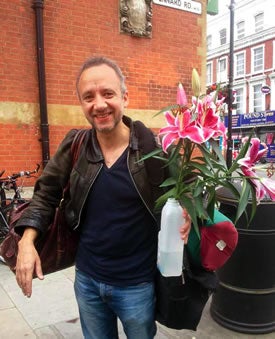British author and barrister Sadakat Kadri LL.M. ’89—the son of a Finnish mother and a Pakistani Muslim father—was a resident of New York during the 9/11 attacks. He was a London commuter on what Brits call 7/7—the July 7, 2005, suicide bombings that targeted morning rush hour. And right after his year at Harvard Law School, Kadri was drawn to the political turmoil in Eastern Europe, where the Iron Curtain was turning to glass. “I need to get there,” Kadri thought to himself in the spring of 1989: to Berlin as the wall was falling, and to Czechoslovakia in the midst of its Velvet Revolution. Armed with a contract to write a travel guide, Kadri lived in Prague for most of the next three years. But it was the terror attacks he witnessed that inspired what is perhaps Kadri’s greatest adventure: four years of research and travel to write the latest of his three books. “Heaven on Earth” (2012) is an exploration of Shariah law that begins with deep history (in ancient Arabia) and closes with contemporary reality: the varieties of present-day Islamic jurisprudence, gleaned from travels to India, Pakistan, Syria, Egypt and Turkey. Kadri, shaken by the attacks and bolstered by his familiarity with Islam, was compelled to write a grounded, respectful book on Shariah. He observed that in an age of emerging global terror, discussions about traditional Islamic law— both in the West and among Muslims—often shed more heat than light. “Noise, rather than information, was filling a void,” Kadri writes in “Heaven on Earth,” “while critical questions were going not just unanswered but unasked.”
He came to believe during his research that repressive interpretations of Shariah are not immovable ancient dictates. “They are actually a reaction to some thoroughly modern developments,” says Kadri, including the 1948 partition of Palestine and the founding of the modern State of Israel and “coups and revolutions” in the Muslim world beginning four decades ago. By 1979, countries including Pakistan and Iran had firmly embraced the “supposed traditions” of a harsh brand of Shariah, he says, along with “ruthless and retrograde approaches toward enforcement.” Today, Islamic jurisprudence is still often associated with “punitive, misogynistic and bellicose attitudes,” says Kadri, “but they are a poor reflection of its 1,400-year history.” Most Muslims regard Shariah as a spiritual concept—“the path laid down by God toward salvation,” he says—and that concept is “balanced by long-standing traditions of mercy, tolerance and flexibility.” “Heaven on Earth” is a lawyer’s cautionary plea for understanding, study and mutual respect in a contemporary world of murderous religious divides. At least part of that plea for understanding—and sensitivity to nations in political turmoil—comes out of Kadri’s Harvard experience. He had studied history and law at Trinity College, Cambridge, but had never been to the United States before, and “the most humdrum aspects of daily life seemed impossibly exotic,” he says. (Included: American supermarkets and clapboard houses in Cambridge that had “the sinister appeal of half-remembered horror movies.”) But above all, there was a new intellectual excitement to law studies. “Discussions just flowed in class, the way they never did [at Trinity],” he says. One day, he emerged from constitutional law class with Professor Laurence Tribe ’66 feeling, says Kadri, that “I had done a semester’s worth of work in one hour.” The Harvard interlude “certainly felt seminal,” he adds. “I began to think of legal disputes in terms of competing narratives—a notion that most lawyers in 1980s England would have thought baffling or laughable. And I was persuaded that legal change can never really be understood without an awareness of its historical and cultural roots.” Since his 1988-1989 year at HLS, Kadri has worked as a travel writer, trial lawyer, legal scholar, columnist and London-based human rights advocate. He spent a decade of full-time practice in criminal, constitutional, and international law with a London firm specializing in human rights and civil liberties. (He is now an “associate tenant” to concentrate on his writing career.) Kadri maintains a special interest in nations beset by upheaval. He visited Syria in 2011 on behalf of the International Bar Association’s Human Rights Institute, and traveled to Burma in late August with the same group. And next? “I don’t think my last book has been written,” says Kadri.
